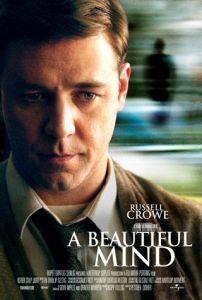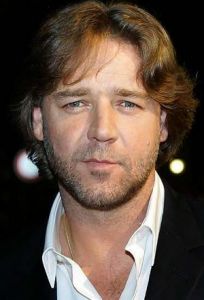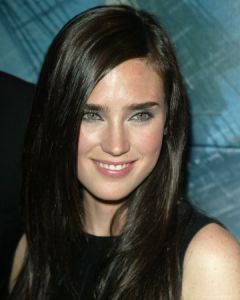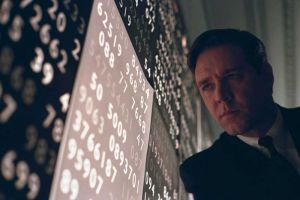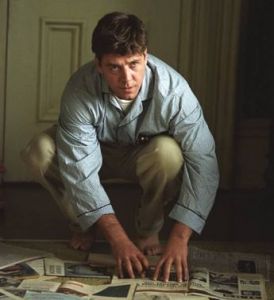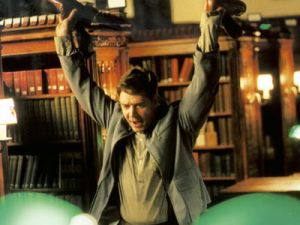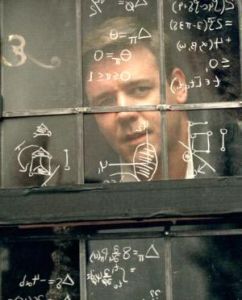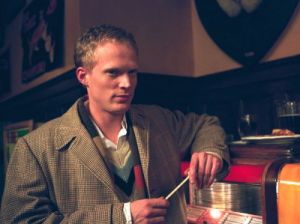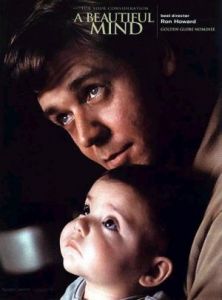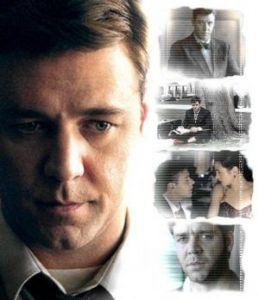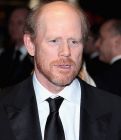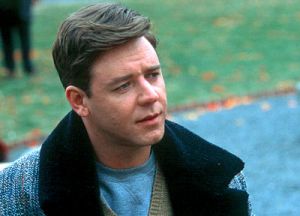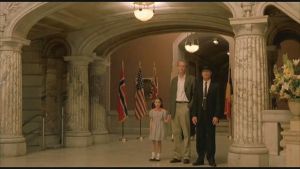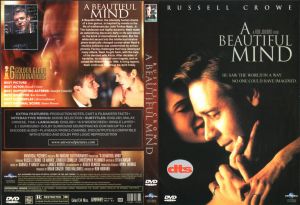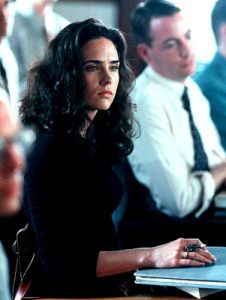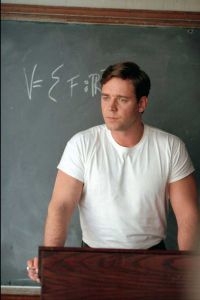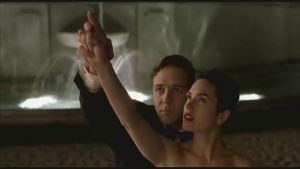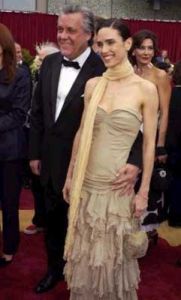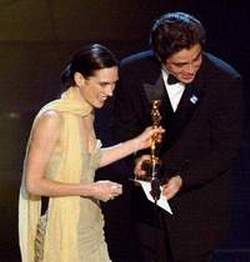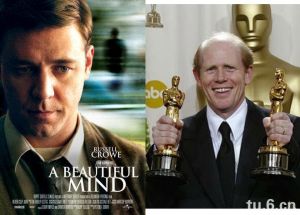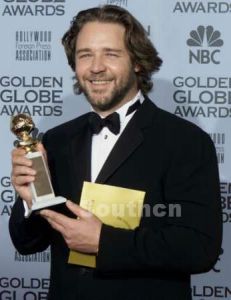A Beautiful Mind 美丽心灵
A Beautiful Mind (美丽心灵) is a 2001 American film based on the life of John Forbes Nash, Jr., a Nobel Laureate in Economics. The film was directed by Ron Howard and written by Akiva Goldsman. It Based loosely on the book of the same name by Sylvia Nasar. The film has been criticized for its inaccurate portrayal of some aspects of Nash's life. The film fictionally portrayed his hallucinations as visual and auditory, when in fact they were exclusively auditory.
Directed by: Ron Howard
Produced by: Brian Grazer, Ron Howard
Written by: Akiva Goldsman, Sylvia Nasar
Music by: James Horner
Cinematography: Roger Deakins
Editing by: Daniel P. Hanley, Mike Hill
Studio: Imagine Entertainment
Distributed by: Universal Studios, DreamWorks
Release date: December 21, 2001
Running time: 134 minutes
Country: United States
Language: English
Genre: Biography Drama
Russell Crowe as John Forbes Nash, Jr., a mathematical genius who is obsessed with finding an original idea to ensure his legacy.
Jennifer Connelly as Alicia Nash, a later student of Nash who catches his interest.
Paul Bettany as Charles Herman, Nash's cheerful, supportive roommate and best friend throughout graduate school.
Ed Harris as William Parcher, a highly dedicated and forceful government agent for the Department of Defense. He recruits Nash to help fight Soviet spies.
Josh Lucas as Martin Hansen, Nash's friendly rival from his graduate school years at Princeton. In the end, Hansen tells Nash that nobody wins, and they are at that point to consider each other as equals.
Adam Goldberg as Sol, a friend of Nash's from Princeton University who is chosen, along with Bender, to work with him at MIT.
Anthony Rapp as Bender, a friend of Nash's from Princeton University who is chosen, along with Sol, to work with him at MIT.
Vivien Cardone as Marcee.
Christopher Plummer as Dr. Rosen, Nash's doctor at a psychiatric hospital.
Judd Hirsch as Helinger, the head of the Princeton mathematics department.
Jason Gray-Stanford as Ainsley Neilson, Symbol cryptography, Nash pays particular attention to his tie.
John Nash (Russell Crowe) arrives at Princeton University as a new graduate student. He is a recipient of the prestigious Carnegie Prize for mathematics. Although he was promised a single room, his roommate Charles Herman (Paul Bettany), a literature student, greets him as he moves in and soon becomes his best friend. Nash also meets a group of other promising math and science graduate students, Martin Hansen (Josh Lucas), Sol (Adam Goldberg), Ainsley (Jason Gray-Stanford), and Bender (Anthony Rapp), with whom he strikes up an awkward friendship. Nash admits to Charles that he is better with numbers than he is with people, which comes as no surprise to them after watching his largely unsuccessful attempts at conversation with the women at the local bar.
Martin Hansen challenges Nash to a game of Go. Though he claims to have played every move in the game correctly, Nash loses and Hansen mocks him: "Gentlemen, The Great John Nash," a quotation that reverberates later when William Parcher mocks him, "Ladies and gentlemen, the great John Nash!" Nash exclaims that "The game is flawed." To make the loss even more humiliating, as Nash gets up to leave he knocks over the board and all the pieces go flying. He falls to the ground and when he recovers and walks toward the camera, the fly on his pants is open.
The headmaster of Princeton informs Nash, who has missed many of his classes, that he cannot begin work until he finishes a thesis paper, prompting him to seek a truly original idea for the paper. A woman at the bar is what ultimately inspires his fruitful work in the concept of governing dynamics, a theory in mathematical economics. After the conclusion of Nash's studies as a student at Princeton, he accepts a prestigious appointment at the Massachusetts Institute of Technology (MIT), along with his friends Sol and Bender.
Five years later, while teaching a class on calculus at MIT, he places a particularly interesting problem on the chalkboard that he dares his students to solve. When his student Alicia Larde (Jennifer Connelly) comes to his office to discuss the problem, the two fall in love and eventually marry.
On a return visit to Princeton, Nash runs into his former roommate Charles and meets Charles' young niece Marcee (Vivien Cardone), whom he adores. Nash is invited to a secret Department of Defense facility in the Pentagon to crack a complex encryption of an enemy telecommunication. Nash is able to decipher the code mentally, to the astonishment of other codebreakers. Here, he encounters the mysterious William Parcher (Ed Harris), who belongs to the United States Department of Defense.
Parcher observes Nash's performance from above, while partially concealed behind a screen. Parcher gives Nash a new assignment to look for patterns in magazines and newspapers, ostensibly to thwart a Soviet plot. He must write a report of his findings and place them in a specified mailbox. After being chased by Russian agents and an exchange of gunfire, Nash becomes increasingly paranoid and begins to behave erratically. After observing this erratic behavior, Alicia informs a psychiatric hospital. Later, while delivering a guest lecture at Harvard University, Nash realizes that he is being watched by a hostile group of people, and although he attempts to flee, he is forcibly sedated and sent to a psychiatric facility. Nash's internment seemingly confirms his belief that the Soviets are trying to extract information from him. He views the officials of the psychiatric facility as Soviet kidnappers. At one point, he gorily tries to dig out of his arm an implant he received at an unused warehouse on the MIT campus which was supposedly used as a listening facility by the DoD (Department of Defense ).
Alicia, desperate to help her husband, visits the mailbox and retrieves the never-opened "top secret" documents that Nash had delivered there. When confronted with this evidence, Nash is finally convinced that he has been hallucinating. The Department of Defense agent William Parcher and Nash's secret assignment to decode Soviet messages was in fact all a delusion. Even more surprisingly, Nash's "prodigal roommate" Charles and his niece Marcee are also only products of Nash's mind. After a series of insulin shock therapy sessions, Nash is released on the condition that he agrees to take antipsychotic medication. however, the drugs create negative side-effects that affect his sexual and emotional relationship with his wife and, most dramatically, his intellectual capacity. Frustrated, Nash secretly stops taking his medication and hoards his pills, triggering a relapse of his psychosis.
While bathing his infant son, Nash becomes distracted and wanders off. Alicia is hanging laundry in the backyard and observes that the back gate is open. She discovers that Nash has turned an abandoned shed in a nearby grove of trees into an office for his work for Parcher. Upon realizing what has happened, Alicia runs into the house to confront Nash and barely saves their child from drowning in the bathtub. When she confronts him, Nash claims that his friend Charles was watching their son. Alicia runs to the phone to call the psychiatric hospital for emergency assistance. Nash suddenly sees Parcher who urges him to kill his wife, but Nash angrily refuses to do such a thing. After Parcher points a gun at her, Nash lunges for him, accidentally knocking Alicia and the baby to the ground. Alicia flees the house in fear with their child, but Nash steps in front of her car to prevent her from leaving. After a moment, Nash realizes that Marcee is a hallucination, because although years have passed since their first encounter, Marcee has remained exactly the same age and is still a little girl. Realizing the implications of this fact, he tells Alicia, "She never gets old." Only then does he accept that although all three people seem completely real, they are in fact part of his hallucinations.
Caught between the intellectual paralysis of the antipsychotic drugs and his delusions, Nash and Alicia decide to try to live with his abnormal condition. Nash consciously says goodbye to the three delusional characters forever in his attempts to ignore his hallucinations. He thanks Charles for being his best friend over the years, and says a tearful goodbye to Marcee, stroking her hair and calling her "baby girl", telling them both he would not speak to them anymore. They still continue to haunt him, with Charles mocking him for cutting off their friendship, but Nash learns to ignore them. Nash grows older and approaches his old friend and intellectual rival Martin Hansen, now head of the Princeton mathematics department, who grants him permission to work out of the library and audit classes. Even though Nash still suffers from hallucinations and mentions taking newer medications, he is ultimately able to live with and largely ignore his psychotic episodes. He takes his situation in stride and humorously checks to ensure that any new acquaintances are in fact real people, not hallucinations.
Nash eventually earns the privilege of teaching again. He is honored by his fellow professors for his achievement in mathematics, and goes on to win the Nobel Memorial Prize in Economics for his revolutionary work on game theory. Nash and Alicia are about to leave the auditorium in Stockholm, when Nash sees Charles, Marcee and Parcher standing and watching him with blank expressions on their faces. Alicia asks Nash, "What's wrong?" Nash replies, "Nothing. Nothing at all." With that, they both leave the auditorium.
There was difficulty when casting Crowe as John Forbes Nash, Jr., who was well-liked by the producers, when he went to film Gladiator in a different time-zone and was difficult to reach for an extended period of time to attach him to the project. Jennifer Connelly was cast as Alicia Nash after Ron Howard (the director) drew comparisons to her and Alicia Nash, both academically and in facial features. Dave Bayer, a professor of Mathematics at Barnard College, Columbia University, was consulted on the mathematical equations that appear in the film. Bayer later stated that he approached his consulting role as an actor when preparing equations, such as when Nash is forced to teach a calculus class, and arbitrarily places a complicated problem on the blackboard. Bayer focused on a character who did not want to teach ordinary details and was more concerned with what was interesting. Bayer received a cameo role in the film as a professor that lays his pen down for Nash in the pen ceremony near the end of the film.
Director
Producer Brian Grazer first read an excerpt of Sylvia Nasar's book A Beautiful Mind in Vanity Fair (an American magazine of pop culture, fashion, and politics published by Condé Nast Publications). Grazer immediately purchased the rights to the film. He eventually brought the project to Ron Howard, who had scheduling conflicts and was forced to pass. Grazer later said that many A-list directors were calling with their point of view on the project. He eventually focused on a particular director, who coincidentally was only available at the same time Howard was available. Grazer was forced to make a decision and chose Howard.
Screewriter
Grazer met with a number of screenwriters, mostly consisting of "serious dramatists", but he chose Akiva Goldsman instead, because of his strong passion and desire for the project. Goldsman's creative take on the project was to not allow the viewers to understand that they are viewing an alternate reality until a specific point in the film. This was done to rob the viewers of their feelings in the same way that Nash himself was.
Makeup
Greg Cannom was chosen to create the makeup effects for A Beautiful Mind, specifically the age progression of the characters. Each character's stages of makeup were broken down by the number of years that would pass between levels. Cannom stressed subtlety between the stages, but worked toward the ultimate stage of "Older Nash". It was originally decided that the makeup department would merely age Russell Crowe throughout the film. However, at Crowe's request, the makeup purposefully pulled Crowe's look towards the facial features of the real John Nash. Cannom developed a new silicone-type makeup that could simulate real skin and be used for overlapping applications, shortening the application time from eight hours to four hours.
The film was shot 90% chronologically. Three separate trips were made to the Princeton University campus. During filming, Howard decided that Nash's delusions should always first be introduced audibly and then visually. This not only provides a visual clue, but establishes the delusions from Nash's point of view. The real John Nash's delusions were also only auditory. A technique was also developed to visualize Nash's epiphanies. After speaking to a number of mathematicians, the filmmakers decided upon a flash of light appearing over an object or person to signify Nash's creativity at work. Two night shots were done at Fairleigh Dickinson University's campus in Florham Park, NJ, in the Vanderbilt Mansion ballroom.
Howard and Grazer chose frequent collaborator James Horner to score the film because of familiarity and his ability to communicate. A running discussion between the director and the composer was the concept of high-level mathematics being less about numbers and solutions, and more akin to a kaleidoscope, in that the ideas evolve and change. Horner chose Welsh singer Charlotte Church to sing the soprano vocals after deciding that he needed a balance between a child and adult singing voice. He wanted a purity, clarity and brightness of an instrument but also a vibrato to maintain the humanity of the voice.
A Beautiful Mind received a limited release on December 21, 2001. It was later released in America on January 4, 2002. During the five-day weekend of the limited release, A Beautiful Mind opened at the twelfth spot at the box office, peaking at the number two spot following the wide release. The film went to gross $170 million in North America and $313 million worldwide.
A Beautiful Mind was released on VHS and DVD in the United States on June 25, 2002 as a two-disc set. The first disc featured two separate audio commentaries from director Ron Howard and Akiva Goldsman, deleted scenes with optional commentary from the director, and production notes. The second disc included documentaries such as "Inside A Beautiful Mind" a making-of documentary, "A Beautiful Partnership: Ron Howard and Brian Grazer" detailing the partnership between the director and the producer, "Development of the Screenplay" discussing Akiva Goldsman scripting of the film, "The Process of Age Progression" detailing the makeup effects, "Casting Russell Crowe and Jennifer Connelly", "Creation of the Special Effects", "Scoring the Film", as well as "Meeting John Nash" displaying the real John Nash. Footage of the real John Nash accepting the Nobel Prize for Economics is also included along with reactions from the winners of the Academy Awards, storyboard comparisons, the theatrical trailer and an advertisement for the soundtrack to the film.
"one of those formulaically rendered Important Subject movies."
—Desson Thomson of the Washington
Crowe's performance as "the biggest load of hooey to stink up the screen this year".
—Charles Taylor of Salon Magazine
I have seen a lot of movies in my time, but this movie just took me by storm. Its uniqueness, ironically enough because it was based on a real life situation was a refreshing change from the usual Hollywood blockbuster.
This movie provided a brilliant insight into many aspects of a genius at work.
Helinger: Mathematicians won the war. Mathematicians broke the Japanese codes... and built the A-bomb. Mathematicians... like you. The stated goal of the Soviets is global Communism. In medicine or economics, in technology or space, battle lines are being drawn. To triumph, we need results. Publishable, applicable results. Now who among you will be the next Morse? The next Einstein? Who among you will be the vanguard of democracy, freedom, and discovery? Today, we bequeath America's future into your able hands. Welcome to Princeton, gentlemen.
Nash: In competitive behavior someone always loses.
Charles: Well, my niece knows that, John, and she's about this high.
Nash: See if I derive an equilibrium where prevalence is a non-singular event where nobody loses, can you imagine the effect that would have on conflict scenarios, arm negotiations...
Charles: When did you last eat?
Nash: ...currency exchange?
Charles: When did you last eat? You know, food.
Nash: You have no respect for cognitive reverie, you know that?
Charles: Yes. But pizza - now, pizza I have enormous respect for. And of course beer.
Nash: I have respect for beer. I have respect for beer!
Thank you. I've always believed in numbers and the equations and logics that lead to reason.
But after a lifetime of such pursuits, I ask, "What truly is logic? Who decides reason?"
My quest has taken me through the physical, the metaphysical, the delusional -- and back.
And I have made the most important discovery of my career, the most important discovery of my life: It is only in the mysterious equations of love that any logic or reasons can be found.
I'm only here tonight because of you [his wife, Alicia].
You are the reason I am. You are all my reasons.
Thank you.
When Nash arrives at MIT after having come from the pentagon he is wearing a topcoat though everyone complains about the air-conditioning is broken and it followed by a scene in which opening windows because of the heat facilitates the film's "meet cute". However this might not be a gratuitous error but a foreshadowing of Nash's mental disturbances.
As Nash walks on the Harvard campus on his way to the math conference, he drops his bag behind him to hug his "roomate" and the young girl. During his conversations with them, the bag remains on the ground. Within one second, just before Nash walks off, the bag goes from being on the ground to being clutched to his chest.
Since the first outdoor scene at Princeton was filmed in winter, but is supposed to take place in the fall, CGI leaves were put on the trees. But the shadow of the trees have no leaves on them.
AFI (American Film Institute) Awards, USA
AFI Actor of the Year - Male - Movies, Russell Crowe
AFI Movie of the Year, Brian Grazer, Ron Howard
AFI Screenwriter of the Year, Akiva Goldsman
Academy Awards, USA
Best Actor in a Leading Role, Russell Crowe
Best Editing, Mike Hill, Daniel P. Hanley
Best Makeup, Greg Cannom, Colleen Callaghan
Best Music, Original Score, James Horner
BAFTA (The British Academy of Film and Television Arts) Awards
Best Film
Best Screenplay - Adapted
Chicago Film Critics Association Awards
Best Actor, Russell Crowe
Best Director, Ron Howard
Best Original Score, James Horner
Best Picture
Best Screenplay, Akiva Goldsman
Best Supporting Actress, Jennifer Connelly
Golden Globes, USA
Best Director - Motion Picture, Ron Howard
Best Original Score - Motion Picture, James Horner
Phoenix Film Critics Society Awards
Best Director, Ron Howard
Best Original Score, James Horner
Best Picture
Best Screenplay - Adaptation, Akiva Goldsman
Satellite Awards
Best Film Editing, Mike Hill, Daniel P. Hanley
Best Original Score, James Horner
Best Performance by an Actor in a Motion Picture, Drama, Russell Crowe
Best Performance by an Actor in a Supporting Role, Drama, Ed Harris
Best Screenplay, Adapted, Akiva Goldsman
Screen Actors Guild Awards
Outstanding Performance by a Female Actor in a Leading Role, Jennifer Connelly
Outstanding Performance by the Cast of a Theatrical Motion Picture
Paul Bettany, Jennifer Connelly, Russell Crowe, Adam Goldberg, Ed Harris, Judd Hirsch, Josh Lucas
Austin Pendleton, Christopher Plummer, Anthony Rapp, Jason Gray-Stanford
AFI Awards, USA
AFI Featured Actor of the Year - Female - Movies, Jennifer Connelly
Academy Awards, USA
Best Actress in a Supporting Role, Jennifer Connelly
Best Director, Ron Howard
Best Picture, Brian Grazer, Ron Howard
Best Writing, Screenplay Based on Material Previously Produced or Published, Akiva Goldsman
BAFTA Awards
Best Performance by an Actor in a Leading Role, Russell Crowe
Best Performance by an Actress in a Supporting Role, Jennifer Connelly
Broadcast Film Critics Association Awards
Best Actor, Russell Crowe
Best Director, Ron Howard
Best Picture
Best Supporting Actress, Jennifer Connelly
Dallas-Fort Worth Film Critics Association Awards
Best Actor, Russell Crowe
Best Director, Ron Howard
Best Picture
Golden Globes, USA
Best Motion Picture - Drama
Best Performance by an Actor in a Motion Picture - Drama, Russell Crowe
Best Performance by an Actress in a Supporting Role in a Motion Picture, Jennifer Connelly
Best Screenplay - Motion Picture, Akiva Goldsman
Phoenix Film Critics Society Awards
Best Actor in a Leading Role, Russell Crowe
Best Actress in a Supporting Role, Jennifer Connelly
Satellite Awards
Best Original Song ("All Love Can Be"), James Horner (music), Will Jennings (lyrics)
Best Performance by an Actress in a Supporting Role, Drama, Jennifer Connelly
附件列表
词条内容仅供参考,如果您需要解决具体问题
(尤其在法律、医学等领域),建议您咨询相关领域专业人士。
如果您认为本词条还有待完善,请 编辑
上一篇 肖先兰——自学英语携子考大学 下一篇 翻译练习(三)

